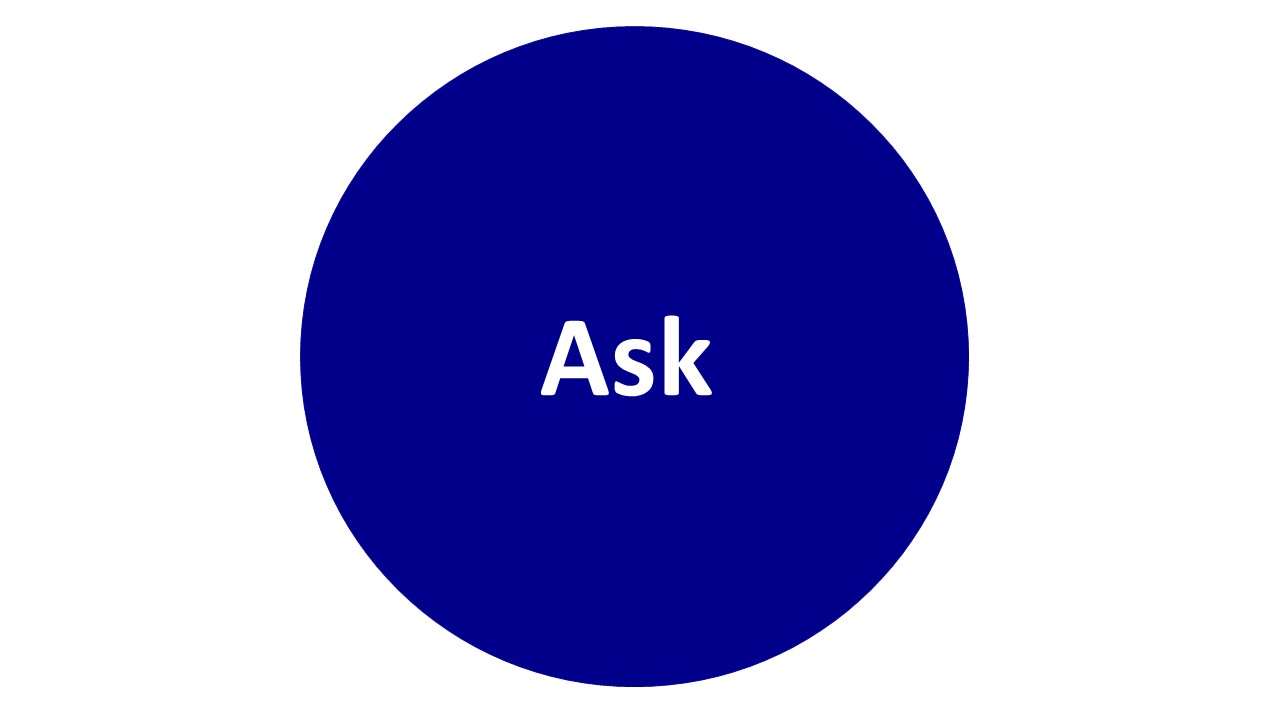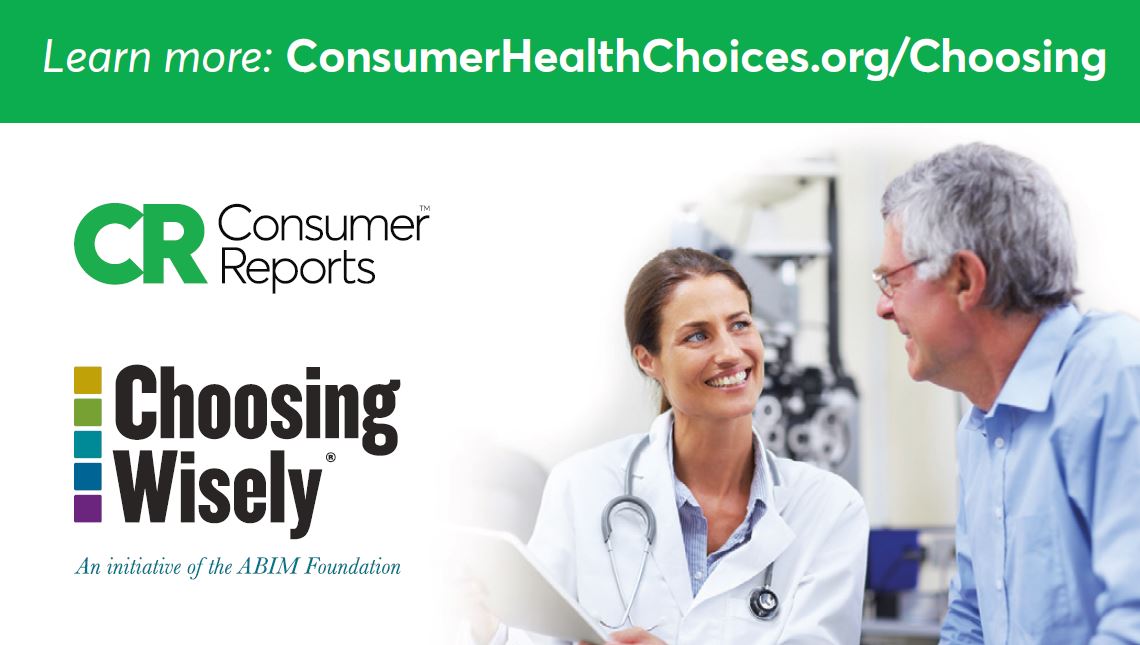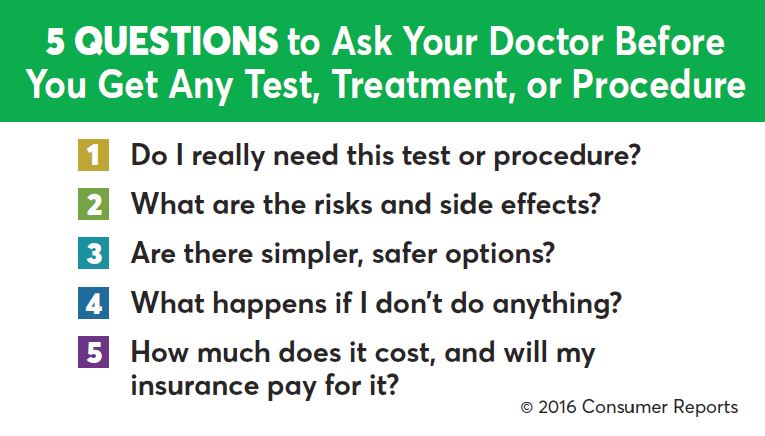Take Action & Ask Questions!
- Get Prepared

- Make a list of questions and concerns to discuss. Bring paper and pen to make notes.
- Make a list of current medicines or bring the bottles. Include over the counter medicines (like aspirin), prescription medicines and dietary supplements (such as vitamins, minerals, or herbs).
- Know your medical history, especially if this is your first visit. Include past and current medical conditions, procedures, including surgeries and complementary/alternative procedures (such as acupuncture).
- Bring your personal information, if this is your first visit or if your information has changed. Include:
- Your emergency contacts
- Employerís address and phone numbers
- Your insurance card(s)
- Family medical history
- Name and address of your previous doctor(s)
Click here to begin your list.
-
Ask Questions
- Some medical tests, treatments, and procedures provide little benefit. In some cases, they may even cause harm. Talk to your doctor to make sure you end up with the right amount of care ó not too much and not too little.
- Use these 5 questions to talk to your doctor about which tests, treatments, and procedures you need ó and which you donít need.
You can download and print this list in letter or wallet card sizes in English and Spanish.
5 QUESTIONS to Ask Your Doctor Before You Get Any Test, Treatment, or Procedure
- Do I really need this test or procedure?
Medical tests help you and your doctor or other health care provider decide how to treat a problem. And, medical procedures help to actually treat it.
- What are the risks?
Will there be side effects? What are the chances of getting results that arenít accurate? Could that lead to more testing or another procedure?
- Are there simpler, safer options?
Sometimes all you need to do is make lifestyle changes, such as eating healthier foods or exercising more.
- What happens if I donít do anything?
Ask if your condition might get worse ó or better ó if you donít have the test or procedure right away.
- How much does it cost?
Ask if there are less-expensive tests, treatments or procedures, what your insurance may cover, and about generic drugs instead of brand-name drugs.
- Do I really need this test or procedure?
- Know Your Rights as a Health Consumer
You have the right to:
- Receive basic health information and services in your language to help you make good health decisions.
- Communicate with your health care provider and take part in decisions about your treatment.
- A fair and efficient process for resolving differences with your health care providers, health plans, and institutions, like hospitals.
- Privacy; including protection of your health care information.
- View, and get a copy of, your health information.
- This infographic explains your rights to access your health information and tips on how to protect your information.
- Learn more about your rights under HIPAA (the Health Insurance Portability and Accountability Act) to protect and access your health information. Resources are available in multiple languages.
- In California, young people can access STD and HIV testing and treatment, birth control, including emergency contraception, pregnancy testing, prenatal care, abortion services and mental health services without permission from a parent or guardian.
- The clinic or doctor can't tell your parents or guardians that you got these services without your consent. Itís the law! But there are important considerations;
- If you are covered under your parent or spouseís health insurance plan, your health information will not be kept private unless you submit a Confidential Communications Request to your plan. More information is available on this request form.
- Your provider may be required to share your personal health information with others outside of the care team in some situations. Examples include if the provider thinks you are putting yourself or someone else in danger, or if there is a large age difference between you and someone you are having sex with. Ask your doctor for more information.
- For more information about young peopleís rights and confidentiality in California visit teensource.org
Screening Test and Preventive Treatments
-
Look up which screening tests and preventative treatments (like vaccines) are recommended before you go to the doctor:
http://healthfinder.gov
- Most insurance plans cover, at no cost, the tests and treatments recommended by the US Preventive Services Task Force.
- Visit our Find the preventive tests you need webpage for more information
Alternative Health Approaches
How to Choose a Doctor/ Physician Information
- Tips from the California Medical Board - How to Make a Good Choice Choosing a New Doctor
How to Prepare a List for your Doctor's Visit
- Click here to begin your list
Know Your Rights as a Health Consumer
- Your rights as a consumer
- For Information about young peopleís rights and confidentiality in California visit teensource.org
- Access and submit a Confidential Communications Request here







